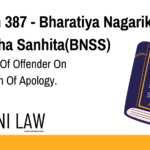Code: Section 374 BNSS
374.
(1) Whenever the finding states that the accused person committed the act alleged, the Magistrate or Court before whom or which the trial has been held, shall, if such act would, but for the incapacity found, have constituted an offence,—
(a) order such person to be detained in safe custody in such place and manner as the Magistrate or Court thinks fit; or
(b) order such person to be delivered to any relative or friend of such person.
(2) No order for the detention of the accused in a public mental health establishment shall be made under clause (a) of sub-section (1) otherwise than in accordance with such rules as the State Government may have made under the Mental Healthcare Act, 2017.
(3) No order for the delivery of the accused to a relative or friend shall be made under clause (b) of sub-section (1) except upon the application of such relative or friend and on his giving security to the satisfaction of the Magistrate or Court that the person delivered shall—
(a) be properly taken care of and prevented from doing injury to himself or to any other person;
(b) be produced for the inspection of such officer, and at such times and places, as the State Government may direct.
(4) The Magistrate or Court shall report to the State Government the action taken under sub-section (1).
Explanation of Section 374 BNSS
Section 374 of the Bharatiya Nagarik Suraksha Sanhita (BNSS) addresses the issue of individuals acquitted on the grounds of unsoundness of mind. When a person is found to have committed an act due to mental illness but would have been held liable for the offense if not for the incapacity, the court or magistrate must take appropriate steps to ensure that the person does not harm themselves or others.
The section provides two main options:
- Detention in Safe Custody: The court may order the person to be detained in a safe place, the nature of which is left to the discretion of the court.
- Delivery to a Relative or Friend: Alternatively, the court may choose to release the individual into the custody of a relative or friend, under strict conditions.
The section also requires that the detention or delivery be done in compliance with relevant health laws such as the Mental Healthcare Act, 2017, ensuring that the person receives proper care.
Illustration
Example 1: Detention in Safe Custody
An individual is acquitted of an assault charge due to unsoundness of mind. The court determines that while the person committed the assault, they were incapable of understanding the wrongfulness of the act due to their mental state. The court orders the individual to be detained in a safe facility to prevent harm to themselves or others.
Example 2: Delivery to a Relative or Friend
In another case, a person is acquitted due to mental illness but is found to have committed a theft. The court decides to release the person into the care of their sister, provided that she submits security and guarantees proper care. The sister is responsible for ensuring the individual is monitored and prevents them from causing harm to anyone.
Common Questions and Answers on Section 374 BNSS
1. What does Section 374 BNSS require when an individual is acquitted due to mental illness?
- Answer: Section 374 mandates that if a person is acquitted on grounds of unsoundness of mind but committed an act that would normally be considered an offense, the court must either detain the person in safe custody or release them into the care of a relative or friend under strict conditions.
2. Can a person be detained in a public mental health facility under this section?
- Answer: Yes, but only if the detention complies with the rules outlined by the Mental Healthcare Act, 2017.
3. What conditions must a relative or friend meet to take custody of the acquitted person?
- Answer: The relative or friend must apply to the court, give security ensuring the individual’s care, and guarantee that the person will be monitored and prevented from harming themselves or others.
4. Does the court have to inform anyone about the actions taken under Section 374?
- Answer: Yes, the court must report the actions taken under Section 374 to the State Government.
Conclusion
Section 374 BNSS provides a legal framework for handling individuals acquitted due to unsoundness of mind but still found to have committed an act that could be considered a criminal offense. The section prioritizes the safety and well-being of the individual, either through detention in a safe facility or under the care of a responsible relative or friend. It also ensures compliance with the Mental Healthcare Act, 2017 and mandates the reporting of actions to the State Government, ensuring accountability and proper care.








